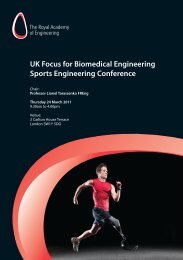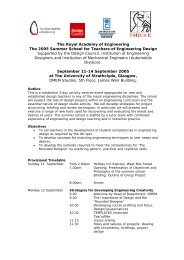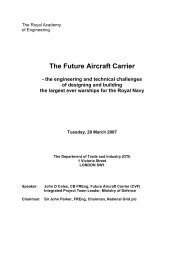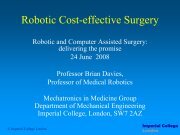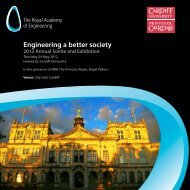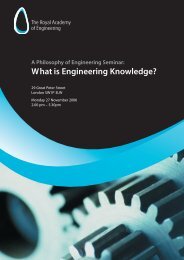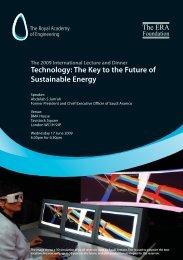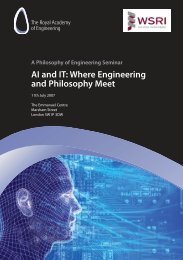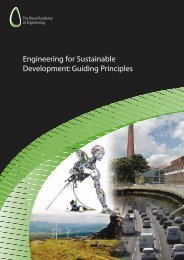Engineering graduates for industry - Royal Academy of Engineering
Engineering graduates for industry - Royal Academy of Engineering
Engineering graduates for industry - Royal Academy of Engineering
Create successful ePaper yourself
Turn your PDF publications into a flip-book with our unique Google optimized e-Paper software.
individual research project with the company.<br />
At this point, they enter into an exclusive<br />
sponsorship agreement with one company.<br />
Perceived benefits<br />
The key benefit is close and active industrial<br />
involvement in the degree programmes,<br />
ensuring relevance and producing highly<br />
employable <strong>graduates</strong>. There are financial<br />
benefits <strong>for</strong> the departments and the students,<br />
with income to departments <strong>of</strong> around £400<br />
per student and student bursaries <strong>of</strong> about<br />
£1,500 per year, as well as funding <strong>for</strong> projects<br />
and prizes. Students also attract a salary <strong>of</strong><br />
around £15,000 while on placement. Some<br />
students receive conditional <strong>of</strong>fers <strong>of</strong><br />
employment at the start <strong>of</strong> their final year. Over<br />
95% <strong>of</strong> students believe they have benefited<br />
from their sponsored programme, beyond the financial assistance 73 . Companies regard the programmes as a costeffective<br />
method <strong>of</strong> recruiting high calibre <strong>graduates</strong> who will match their requirements.<br />
Challenges<br />
Building a committed sponsoring consortium is a huge undertaking. Changes in company <strong>for</strong>tunes, priorities, and key<br />
personnel can have major repercussions. Academic leadership is critically important and replacing a dedicated director<br />
could be challenging. Consortium expectations need careful management. Students graduating from sponsored<br />
programmes are in significant demand and can be tempted to take <strong>of</strong>fers <strong>of</strong> employment from other companies. This<br />
can result in sponsoring companies becoming disillusioned and questioning the value <strong>of</strong> their consortium membership.<br />
Effective practice exemplar 15: engCETL at Loughborough<br />
The Faculty <strong>of</strong> <strong>Engineering</strong> at Loughborough first established dedicated engineering education support in 1997. In<br />
2005, the Faculty’s reputation <strong>for</strong> excellent industrial links and educational technology development resulted in the<br />
award <strong>of</strong> HEFCE funding to establish the Centre<br />
<strong>for</strong> Excellence in Teaching and Learning<br />
(engCETL) with £2.5M <strong>for</strong> running costs and<br />
£1.65M <strong>for</strong> capital build. Now with 12 full-time<br />
equivalent staff, its remit covers a range <strong>of</strong><br />
engineering education activities, with<br />
particular emphasis on links with <strong>industry</strong>.<br />
The relationship with departments is promoted<br />
by academics seconded from each <strong>of</strong> the<br />
engineering and technology departments <strong>for</strong><br />
a small percentage <strong>of</strong> their time to act as<br />
champions <strong>for</strong> the Centre.<br />
The engCETL Advisory Board consists <strong>of</strong> a<br />
range <strong>of</strong> stakeholders, including academics,<br />
support staff, students, industrialists and<br />
representatives from engineering institutions.<br />
It focuses on topics relevant to the provision <strong>of</strong> experience-led degrees, such as accrediting work based learning and<br />
placements, models <strong>of</strong> <strong>industry</strong> engagement and Bologna compatibility.<br />
73<br />
Soltani-Tafreshi, F., Twigg, D.R., and Dickens, J.G. (2009) The Role <strong>of</strong> industrial involvement in<br />
education <strong>of</strong> engineering students. STEM PRM 2009, 30 June 2009, Loughborough, UK.<br />
38 The <strong>Royal</strong> <strong>Academy</strong> <strong>of</strong> <strong>Engineering</strong>





